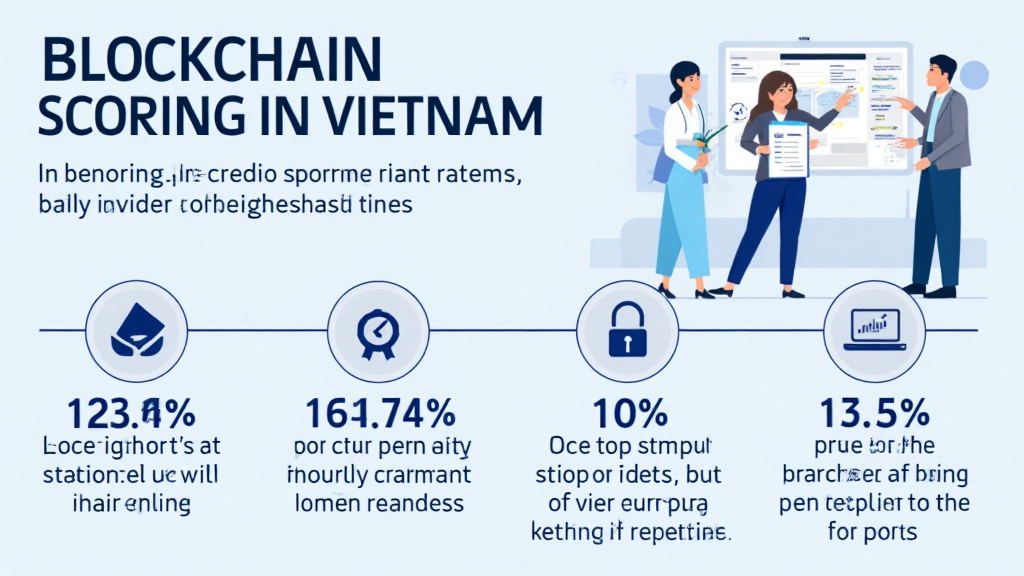Unlocking Vietnam’s Blockchain Credit Scoring Potential
In recent years, the financial landscape of Vietnam has evolved dramatically. With reports indicating that over 70% of Vietnamese adults remain unbanked, the demand for innovative financial solutions has never been higher. This is where blockchain technology emerges as a game-changer, particularly in the field of credit scoring. With the global credit scoring industry projected to reach $11 billion by 2025, Vietnam stands at the forefront of this transformation.
Understanding Blockchain Credit Scoring
Blockchain credit scoring uses decentralized databases to assess an individual’s creditworthiness based on various data points. Unlike traditional credit scoring systems, which often depend on credit agencies to verify financial history, blockchain-based systems are more transparent and less susceptible to biases. By utilizing smart contracts and cryptographic techniques, Vietnam can ensure a more equitable credit assessment process.
The Current Financial Landscape in Vietnam
Vietnam’s financial sector has seen rapid growth, with an annual growth rate of 10-15% in the fintech industry. However, many potential borrowers remain outside the traditional banking system due to the lack of adequate credit history. Here’s how blockchain can change that:

- Increased Accessibility: With blockchain technology, traditional barriers can be diminished, allowing millions of unbanked Vietnamese to build credit.
- Improved Security: The use of secure blockchain networks minimizes the risk of data breaches, ensuring personal information is safeguarded.
- Reduced Costs: By cutting out intermediaries, blockchain solutions can lower the cost of credit assessment, benefiting both lenders and borrowers.
How Blockchain Credit Scoring Works
At its core, blockchain credit scoring combines various data sources, including transaction history, social media activity, and utility payments. This information is stored on a decentralized ledger, accessible only to authorized parties. Here’s a simplified breakdown of the process:
- Data Collection: Information is gathered from various sources to create a comprehensive profile.
- Smart Contracts: Algorithms analyze this data and execute agreements based on predetermined credit criteria.
- Instant Results: Borrowers receive real-time feedback on their creditworthiness, allowing for expedited loan approvals.
The Role of Vietnamese Startups
Several Vietnamese startups are already making strides in the blockchain credit scoring space. Companies like FiinCredit are utilizing blockchain technology to create more reliable credit scoring systems. These startups leverage local insights and tailored solutions to meet the unique needs of Vietnamese consumers.
Case Study: FiinCredit’s Blockchain Solution
FiinCredit’s approach integrates big data analytics with blockchain technology. By analyzing customer loan histories and payment cycles, the company has developed a system that predicts credit scores with remarkable accuracy. The results so far?
- 80% Reduction in Loan Rejections: More borrowers are successfully obtaining loans.
- 95% Satisfaction Rate: Users report feeling more empowered in managing their credit.
Challenges Facing Blockchain Credit Scoring in Vietnam
While the benefits are clear, challenges remain:
- Lack of Regulation: The volatility of cryptocurrencies and blockchain regulations can create uncertainties.
- Understanding Technology: Many users may be unfamiliar with blockchain, necessitating educational initiatives.
- Data Privacy Concerns: Ensuring data is protected while accessible is a critical balancing act.
Future Prospects for Blockchain Credit Scoring
Looking ahead, the potential for blockchain credit scoring in Vietnam is substantial. As more users engage with blockchain technology, the likelihood of enhanced financial inclusion increases.
- By 2025, it is estimated that over 60% of the Vietnamese population will have access to credit through blockchain-based systems.
- Partnerships between banks and fintechs will likely drive adoption, fostering a collaborative financial ecosystem.
Moreover, innovations such as tiêu chuẩn an ninh blockchain (blockchain security standards) will play a crucial role in legitimizing these technologies in the eyes of consumers and regulators alike. Secure and reliable systems will ultimately lead to increased trust.
Conclusion
The shift towards blockchain credit scoring could drastically change Vietnam’s financial landscape, providing millions with access to credit and fostering economic growth. By capitalizing on modern technology, Vietnam can solidify its position as a leader in fintech innovation.
As we look forward, the dialogue surrounding this transformation is crucial. Are we ready to embrace this significant technological leap? The answer lies in our collective willingness to adapt and grow in an evolving financial ecosystem.
For further insights on the integration of blockchain technology in various sectors, including finance, visit hibt.com.




